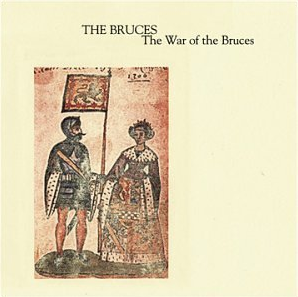
Worldwide, the British rock band the Beatles released 12 studio albums, 5 live albums, 51 compilation albums, 36 extended plays (EPs), 63 singles, 17 box sets, 22 video albums and 53 music videos. In their native United Kingdom, during their active existence as a band, they released 12 studio albums, 1 compilation album, 13 EPs, and 22 singles. The early albums and singles released from 1962 to March 1968 were originally on Parlophone, and their albums and singles from August 1968 to 1970 were on their subsidiary label Apple. Their output also includes vault items, remixed mash-ups and anniversary box-sets.

"Blue Monday" is a song by the British rock band New Order. It was released as a 12-inch single on 7 March 1983 through Factory Records. It appears on certain cassette and CD versions of New Order's second studio album, Power, Corruption & Lies (1983). The track was written and produced by Gillian Gilbert, Peter Hook, Stephen Morris and Bernard Sumner.

The Burdens of Being Upright is the debut studio album by American singer-songwriter Tracy Bonham, released on March 19, 1996 by Island Records.

Down Here is the second album by American singer-songwriter Tracy Bonham, released on April 18, 2000, through Island Records. The album was recorded between March 1998 and December 1999 by Bonham and producers Mitchell Froom, Tchad Blake, Mark Endert and Don Gilmore. The album was supposed to be released in October 1998 under the title Trail of a Dust Devil, but was delayed until the spring of 2000, as Island was going through a major restructuring.

Gift is the third studio album and major label debut by American alternative metal band Taproot. It was released on June 27, 2000. The singles "Again & Again" and "I" reached No. 39 and No. 34 on the Mainstream Rock chart. The album has sold over 250,000 copies.

Welcome is the second major label album by American alternative metal band Taproot. It was released on October 15, 2002. "Poem" served as the album's lead single and reached No. 5 on the Mainstream Rock chart, propelling the group to mainstream success. A follow-up single, "Mine," was released and its video was directed by System of a Down bassist Shavo Odadjian. A third single and video was announced for "Art," but curiously Atlantic pulled the plug soon after the announcement, further irking fans who claimed the label was holding Taproot back. Welcome remains Taproot's most successful record, selling over 450,000 copies.

"Push It" is a song by American rock band Garbage from their second studio album, Version 2.0 (1998). It was released on April 20, 1998, as the album's lead single. Lead singer Shirley Manson elaborated on the song's dreamy verse structure versus the confrontational chorus: "[It's about] the schizophrenia that exists when you try to reconcile your desires and demons with the need to fit in. It's a song of reassurance". The track contains a musical quotation of the Beach Boys' 1964 song "Don't Worry Baby".
Hate Dept. is an American industrial/punk rock band, formed in 1991 by Steven Seibold. Seibold is a multi-instrumentalist who writes, records and releases Hate Dept. albums with minimal outside help. He formed Hate Dept. in 1991 in reaction to fickle 'electro' audiences and antipathy towards live electronic bands, taking his sound in a more punk direction.

State Songs is a concept album released by John Linnell in 1999. It was Linnell's third solo project and first full solo album. It consists of tracks that are named after, and are at least partially inspired by, 15 of the 50 U.S. states. The album is surrealist in nature, suggesting that there is another West Virginia inside of the state, that one can drive a house to Idaho, that Montana is a leg, Iowa is a witch, Oregon chases after people, and Arkansas has sunken and may be replaced by a ship of its exact shape and size.

Apartment Life is the second studio album by American band Ivy, released by Atlantic Records on October 6, 1997. After being dropped from Seed Records following the release of Realistic in 1995, the group signed to Atlantic due to connections that Adam Schlesinger had with the record label. In addition to band members Andy Chase and Schlesinger, the album was produced by Lloyd Cole and Peter Nashel. In contrast to their previous releases, such as Lately (1994) and Realistic, Apartment Life is a pop album with varying forms of production consisting of keyboards, brass, and string instruments. Some of the compositions featured on the record were compared to the works of My Bloody Valentine, Pixies, and the Smiths. To promote the album, Ivy embarked on a series of promotional tours across the United States.

Australian rock group Hoodoo Gurus have released ten studio albums, thirty-seven singles, two extended plays, six compilation albums and 3 video albums. Formed in January 1981, the band was originally known as Le Hoodoo Gurus for the release of their first single, "Leilani", in October 1982. As Hoodoo Gurus, the band signed with Big Time Records and premiered their debut album, Stoneage Romeos, in March 1984. Also issued in the United States through A&M Records, the record remained atop the Alternative/College Albums Chart for four consecutive weeks, with it also becoming one of the most played albums of that year on the college network. The group's subsequent albums, Mars Needs Guitars!, Blow Your Cool! and Magnum Cum Louder, all reached the Billboard 200.

Puya is a Puerto Rican progressive metal band. Formed in 1991, the band rose to prominence with their fusion of jazz, salsa and heavy metal.
Smile was an American rock band.

The War of the Bruces is the second album, released in 2002, by The Bruces.
The comprehensive discography of Wumpscut, a Germany-based electro-industrial artist, consists of eighteen studio albums, seven EPs, thirteen compilation albums, and eighteen singles.

"Here We Go Again" is a country music standard written by Don Lanier and Red Steagall that first became notable as a rhythm and blues single by Ray Charles from his 1967 album Ray Charles Invites You to Listen. It was produced by Joe Adams for ABC Records/Tangerine Records. To date, this version of the song has been the biggest commercial success, spending twelve consecutive weeks on the US Billboard Hot 100 chart, peaking at number 15.

"Because" is a song recorded by English rock band The Dave Clark Five from their third studio album American Tour (1964). The song was produced by Adrian Clark, the song was originally the B-side to "Can't You See That She's Mine" in the UK.

"This Is the Day" is a song by American band Ivy, included on their second studio album, Apartment Life (1997). It was released as the record's third single in the United States on October 19, 1998 by 550 Music following its inclusion in the 1998 American comedy film There's Something About Mary. The group had just been dropped by Atlantic Records but eventually signed to 550 Music after they reissued the parent album. The track was written by Dominique Durand, Adam Schlesinger and Andy Chase, with the latter two producing it. It is a pop and alternative pop song that features the use of horns and was compared to the works of the Smiths.
Shadow was a music group in the funk-soul genre that was a spin-off from the Ohio Players. They released three albums on the Elektra label. They were Love Lite in 1979, Shadow in 1980, and Shadows in the Street in 1981. They also released a number of singles over the period from 1979 to 1981. There seems to be a degree of mystery as to who the actual members of the group were.

Where Are You Going is a 1973 album by Shirley Horn.
















